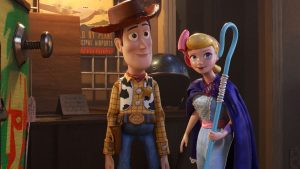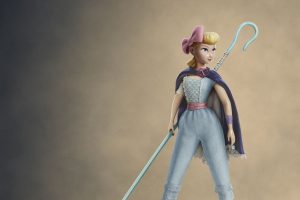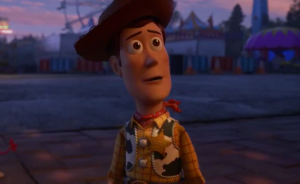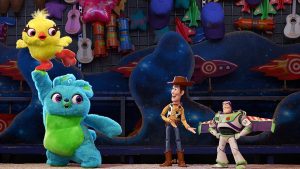This review comes at a strange time, just a little over a month since Pixar’s Onward hit theaters – long after I should already have been able to see this film in a pre-coronavirus world, and long before I should have been able to catch it on streaming. But here we are, entering a new and uncertain chapter of the film industry’s history: one in which films now leave theaters and hop into the ancillary markets much earlier than expected.
Unfortunately, Onward suffered the consequences of arriving on the very weekend that much of the world suddenly realized just how dangerous the coronavirus crisis was quickly becoming – it pulled only small crowds to the box-office, and even those became impossible to muster when theaters collectively chose to close down. As a result, I feel safe in assuming that not many people have seen Onward yet, and for those of you who haven’t, here’s my review. I will not call it “late”, for a movie review is never late – it arrives precisely when it means to.
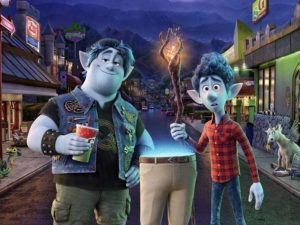
Onward is not, strictly speaking, Pixar’s first adventure in the fantasy genre – but it is the first one with Elves, and that’s got to count for something. Set in a magic-infused world of wonder that has slowly declined with the inevitable advent of technology and industrialism, the film follows two Elves on their mighty quest to spend a single day with the ghost of their dead father, who can be brought back to life with a little help from a magical gemstone, a wizard’s staff, and an absent-minded Manticore.
Appropriately, the film revels in meta-humor, with plenty of loving shout-outs to mythical characters, creatures and locales; Easter eggs galore for the keen-eyed; and all the standard fantasy tropes we know and love. Because of the unusual circumstances allowing us to watch Onward from the comfort of our own homes, it’s tempting to watch the film with a finger poised over the pause button, trying to examine every corner of the screen for these whimsical details (though some are obvious: such as a fast-food restaurant whose giant neon signboard reads “Burger Shire: Now Serving Second Breakfast!”). I encourage you to try and refrain from doing so, at least on your first watch, so you don’t miss out on the story itself. As Martin Scorsese would advise – just try to pretend you’re in a theater.
Onward‘s multitude of callbacks to classic fantasy literature and myths get the film in trouble in more ways than one, unfortunately. Whereas other Pixar films usually involve some unique, hilarious twist, and immerse the viewer in a fully fleshed-out world rich with individuality, Onward‘s twist has been explored in dozens of books and movies before, most successfully in Terry Pratchett’s satirical Discworld novels, and its world is mostly built from borrowed material. This makes it hard to sell people on the worldbuilding premise, because the film doesn’t scream creativity like Pixar’s previous hits: Coco, Inside Out, Toy Story, Finding Nemo, Monsters Inc., etc.
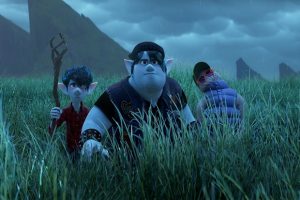
So what do you sell them on? Well, Pixar seems to think that audiences just want a good long cry, and markets its films accordingly – but Onward is really more heartwarming than sad. Don’t get me wrong: it has plenty of sad scenes, but the story, and its resolution, are more poignant and subtly bittersweet than outright soul-crushing. This is sadness done right; sadness used as an essential ingredient of a larger story, rather than for shock-value or in a formulaic fashion.
The story is carried by two extremely likable protagonists, whose contrasting and conflicting personalities balance each other out very nicely – Ian Lightfoot (voiced by, and almost certainly modeled after, Tom Holland) is the indecisive, socially awkward youngest member of the Lightfoot family, who was born after his father’s death, and thus relies on second-hand accounts of his father to build his own impression of him. Barley Lightfoot (Chris Pratt), the older brother, is something of a gentle giant, with relatable, but niche, interests: ancient history, magic, and mythology. The voice-work on both characters is solid, though unremarkable – which possibly benefits Pratt, as he is controversial enough in his personal life that distancing him from the characters he plays isn’t exactly a bad idea.
The small supporting cast is filled out by Julia Louis-Dreyfuss as the Lightfoots’ mother, Laurel, whose almost superhuman strength (seemingly obtained through routine aerobics sessions) feels like it should be more of a big deal than it is; The Manticore (Octavia Spencer), once an Athena-esque figure of legend who gifted heroes with magical weapons and wisdom, now a worn-down restaurant owner just trying to host karaoke night; and Lena Waithe as “Pixar’s first openly gay character”, a cop who appears in one scene and has a single line of dialogue referencing her girlfriend’s kid. It’s a small step forward for the LGBTQ+ community, but in a film where Laurel Lightfoot and The Manticore share several scenes together and have undeniable chemistry as they go on their own little lawless adventure to restore The Manticore to her former glory, it’s also a missed opportunity.
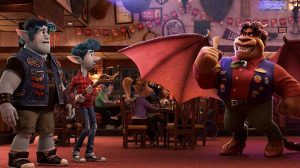
The quality of the film’s animation is nowhere near as spectacular as films like Coco or Brave – but in the world we now live in, it’s possible Onward will be nominated for an Oscar simply because so many other animated films will be pushed back to next year.
Honestly, if no better challenger arrives on the scene between now and next Oscar season, I wouldn’t mind seeing this unfortunate underdog eke out a win. Not only do I relish the thought of a sequel (yeah, yeah, I know, Pixar wants to focus on original content: well, tell them to stop coming up with original content that demands a follow-up!), but I think it would be welcome compensation for the film’s lost audience appeal and box-office returns – not to mention petty vengeance on coronavirus for all the damage and disruption it’s caused.
Movie Rating: 9.5/10
